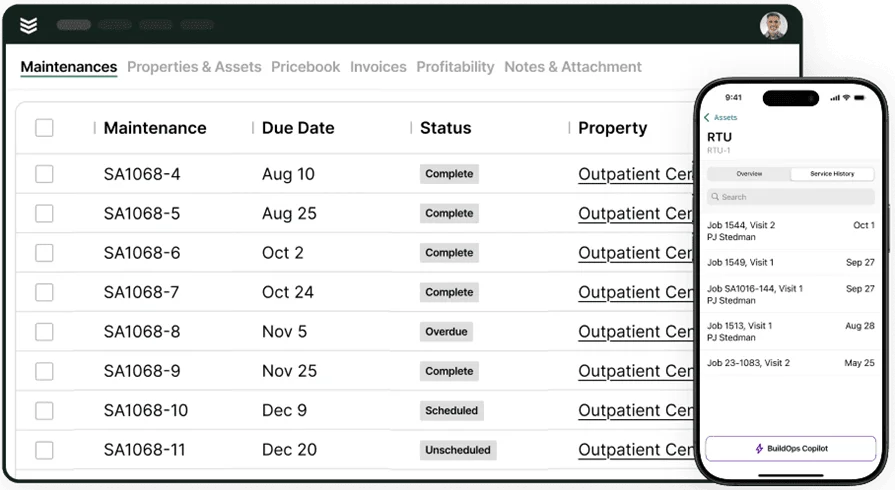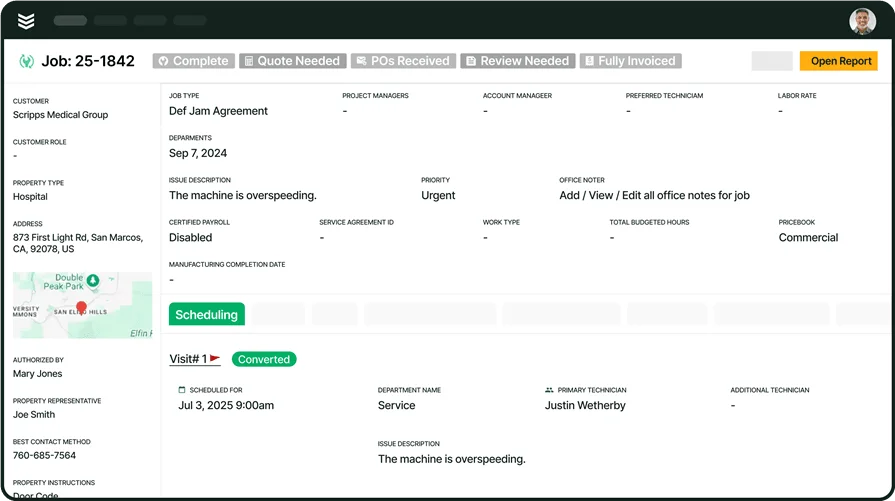If you’re still scribbling job notes on paper or waiting on techs to call in updates, you already know the pain: missed details, lost time, and plenty of backtracking. That kind of chaos slows everything down. A solid work order app fixes that. It gives your team what they need—job info, updates, and next steps—right in their pocket. Whether it’s a same-day repair or a stack of scheduled jobs, these tools keep your crew on track and your jobs moving without the guesswork.
- How to choose a work order app that fits your service technicians
- 6 key features to look for in work order management apps
- 8 best work order apps for field service contractors
- 5 benefits of using work order apps in the field
- 4 key FAQs about work order management apps answered
Not every app deserves a spot on your team. Some are slow. Some miss features your crew depends on. Others just don’t work how field service jobs really play out. That’s where platforms designed around field service management make the difference—connecting the field and office without the mess. Next, we’ll break down what makes a work order app worth using in the real world.
How to choose a work order app that fits your service technicians
Whether you're managing electrical installs, equipment maintenance, or emergency repairs, the work order app your techs use matters. For field service contractors—especially electricians—details can’t get lost, and updates can’t fall through the cracks. You need something that moves as fast as the job demands.
Great work order apps help your crew log job details, track tasks, and communicate from the field—without slowing them down or making them jump through hoops. Before picking a solution, make sure it matches the way your team actually works in the field. Here's what to look for:
- Ease of use in the field – Can techs pull it up quickly, even with gloves on? Does it take too many taps to check a job status or upload a photo? Can they create or update a work order without fumbling through menus?
- Offline access – What happens when your crew is working in a basement, rural site, or anywhere without strong reception? Can the work order app log updates offline and sync them when the signal comes back? Can it store site info or materials used without needing real-time data?
- System connections – Does the app talk to the tools you already use—like dispatch boards, time tracking, inventory, or billing systems? Can it reduce double entry and make updates flow straight into invoicing or reporting without extra steps?
- Mobile design that makes sense – Is this really a mobile-first tool—or just a desktop platform squeezed into a phone? Can techs fill out job notes, close work orders, and snap before-and-after photos easily from the field?
- Features that matter for service work – Does it support job scheduling, custom forms, equipment tracking, and checklists? Can you assign tasks, track job progress in real time, and attach photos or customer signatures? Does it support multiple users working on the same ticket?
A good work order app makes the field-to-office handoff clean. It cuts out the miscommunication, covers all the job details, and lets techs focus on doing the work—not figuring out how to document it. Next, we’ll look at the top features that set the best work order management apps apart.
6 key features to look for in work order management apps
The best work order apps help field service teams stay sharp in the field, not stuck chasing paperwork or double-checking job details. Whether you're managing HVAC repairs, plumbing installs, refrigeration calls, or system inspections, every job hinges on clear communication and quick access to information.
The work order management apps that actually hold up in the field aren’t just about digital tickets—they’re about connecting your techs, your office, and your customers in real time. Here are six features that make a work order app worth using on every job.
1. Real-time scheduling and dispatching
At the core of any good work order app is the ability to control the flow of jobs. Field service scheduling and dispatch tools make it easy to assign, reassign, and adjust jobs on the go—without phone tag or paper lists. Let’s say a job gets canceled while your crew is on lunch. Instead of waiting to find out later, your dispatcher reassigns the nearest available tech to another service call a few blocks away. The tech gets the update on their phone, reviews the job details, and heads out—no downtime, no confusion.
2. CRM with built-in job history
The best work order management apps connect with a CRM system that holds customer records, site notes, and past service info. That history helps techs walk in with the full story—so they don’t waste time figuring it out from scratch. Take a maintenance tech who’s been sent to fix a rooftop unit. With a connected CRM, they see notes from the last two visits, the part that was backordered, and the fix that didn’t stick. They roll up already knowing the problem—and bring the part that actually solves it.
3. Service agreement automation
For service contractors who manage recurring maintenance or bundled visits, service agreement tools are critical. These tools track contract terms, auto-generate work orders, and keep commitments from falling through the cracks. Suppose your team handles quarterly checkups for dozens of clients. Instead of relying on calendar reminders or spreadsheets, your app generates the work orders automatically, builds the schedule, and keeps the job queue full—without manual entry or missed appointments.
4. Quoting and job scoping from the field
The best work order apps also support quoting—so techs can build accurate scopes of work and get approvals while still on-site. With construction quoting software tied to your work orders, everything from parts to labor is logged in real-time. Say a tech finds additional work during a repair—like a failing pump that wasn’t part of the original job. They build the quote in the app, send it to the office or customer for review, and once approved, convert it straight into a work order. No second visit. No extra paperwork. No delays.
5. Invoicing and payment tools
A job’s not done until the invoice is sent. Work order invoicing and payment processing features built into the app mean techs can generate invoices and collect payment in the field—right after finishing the work. Let’s say a plumber finishes an urgent leak repair. The customer signs off, and the tech sends the invoice through the app and takes payment on-site. No waiting for the office, no mailing bills, and no risk of losing track of what’s owed.
6. Time tracking and performance reports
Good data helps you run tighter jobs. Time tracking tools let techs log hours straight from the work order. Meanwhile, reporting features show trends in labor usage, job types, and performance. Maybe your service manager notices that some two-hour jobs keep turning into four. With accurate reporting tied to work orders, they dig into which jobs take longer, where the gaps are, and what needs to change—before it costs more than it should.
Other notable features for work order apps
While the essentials keep your operation running, the best work order apps often include extra features that give contractors an edge—especially when dealing with larger teams, tighter deadlines, or more complex jobs. These tools may not be required on every site, but they add serious value when you're looking for a work order management app that can grow with your business.
- Fleet tracking – With fleet tracking tools, managers can monitor vehicle locations in real time, reduce idle time, and coordinate tech movement more efficiently—especially during emergency calls or high-volume days.
- Pipeline visibility – A job pipeline view helps project managers track job status across the full lifecycle—from quote to completed work order. Great for staying ahead of bottlenecks and backlogs.
- Reporting and dashboards – Custom reporting dashboards give insight into tech productivity, job completion rates, customer trends, and other KPIs. These data points help you make smarter operational calls tied directly to your work order app activity.
These added tools won’t always be the first thing a tech uses on-site—but they’re part of what makes the best work order management apps stand out for fast-moving field service businesses.
8 best work order apps for field service contractors
Whether you're running HVAC calls, electrical installs, or plumbing maintenance, the best work order apps keep your jobs on track without slowing your techs down. These tools manage dispatch, updates, and job closeouts in the field—without techs having to call the office for every change. Below, we highlight the top work order management apps trusted by field service contractors today, starting with BuildOps, the go-to platform for commercial service businesses.
1. Best for commercial: BuildOps
BuildOps is specifically built for commercial contractors, offering a complete field service platform that ties together scheduling, dispatch, work orders, quoting, and invoicing. It gives teams a real-time view of the entire job lifecycle, from the first call to final payment. With seamless communication between the office and field, your techs can pull up work orders, update job statuses, and capture customer sign-offs—all from one app.
Industry Specialization: Commercial
How Pricing Works: Subscription-based, per technician. Pricing varies based on team size and needs.
What Sets It Apart: Built specifically for commercial field work, BuildOps offers real-time dispatch boards, AI-powered notetaking, and mobile job tracking—giving both techs and back-office staff instant access to job data. No more bouncing between systems.
Key Features:
- Real-time dispatch board for live scheduling updates
- AI-guided service note capturing
- Mobile job tracking with status syncing

See BuildOps in action.
We help contractors manage work orders, track job updates, and stay connected.
2. Best for residential: Housecall Pro
Image Source: Housecall Pro
Housecall Pro is a mobile-first solution designed for small to mid-sized residential contractors. It offers job scheduling, invoicing, customer communication, and payment collection in a single platform. It’s ideal for solo techs and smaller teams that want a quick, easy setup—but may feel limiting for larger companies that need deeper job reporting or commercial features.
Industry Specialization: Residential & Small Commercial
How Pricing Works: Monthly subscription with per-user pricing that starts at $59. Tiered plans based on features.
What Sets It Apart: Simple, clean interface tailored to smaller teams that need fast quoting, online booking, and customer texting features.
Key Features:
- Online booking and customer reminders
- One-click invoicing and payment collection
- Scheduling dashboard with drag-and-drop tools
3. Best for general contractors: Jobber
Image Source: Jobber
Jobber is a strong all-around field service app geared toward general contractors and small service businesses. It offers tools for quoting, job tracking, and invoicing with a clean mobile interface and robust client communications. It’s a solid option for teams that handle short-cycle jobs—but may lack the depth larger commercial contractors need for asset tracking or complex workflows.
Industry Specialization: General Field Service
How Pricing Works: Monthly subscription with user-based pricing. Plans vary by included features.
What Sets It Apart: Great for teams that manage a steady volume of one-off service jobs, with strong customer-facing features like automated updates and follow-ups.
Key Features:
- Work order management tied to client records
- Quote-to-invoice conversion in a few clicks
- Scheduling calendar with task reminders
4. Best for asset-heavy teams: Fiix
Image Source: Fiix
Fiix is a CMMS-based solution that leans heavily into asset maintenance and facility work, making it a solid fit for teams managing ongoing repairs and preventative maintenance. It automates work order creation based on asset triggers, tracks equipment histories, and gives insight into failure trends. While powerful in manufacturing and facility service settings, it may be too structured for contractors focused on high-volume field dispatch.
Industry Specialization: Maintenance & Asset Management
How Pricing Works: Tiered monthly plans, based on user count and feature access.
What Sets It Apart: Combines CMMS features with work order tracking, giving teams insight into asset health, parts usage, and service history.
Key Features:
- Auto-generated work orders tied to asset rules
- Equipment service logs and parts tracking
- Maintenance scheduling calendar
5. Best for maintenance-focused contractors: UpKeep
Image Source: Upkeep
UpKeep delivers an easy-to-use mobile CMMS for technicians working in maintenance-heavy environments. It provides work order creation, asset tracking, photo uploads, and location-based updates. While it’s strong for internal maintenance teams, it may lack some of the customer-facing tools field service contractors rely on, like dispatch boards or CRM integration.
Industry Specialization: Facilities, Maintenance & Industrial
How Pricing Works: Monthly subscription with basic, professional, and business-plus tiers.
What Sets It Apart: Designed for mobile-first maintenance, with QR code scanning and technician-first workflows.
Key Features:
- Barcode/QR work order lookup
- Offline mobile capabilities
- Location-based job tracking
6. Best for multi-trade contractors: WorkStraight
Image Source: WorkStraight
WorkStraight offers a cloud-based work order management solution focused on multi-trade contractors needing flexibility across job types. It supports general task tracking, customer service requests, and internal operations—all through a customizable dashboard. However, it lacks some of the deeper integrations and mobile-first tools that service contractors often need in the field.
Industry Specialization: Multi-trade & General Contracting
How Pricing Works: Flat-rate monthly pricing with scalable user limits.
What Sets It Apart: A general-purpose work order tracker with easy form customization and simplified workflows for small operations.
Key Features:
- Custom work order forms and fields
- Service request portal for clients
- Task status updates and completion logs
7. Best for enterprise service teams: Fieldpoint
Image Source: Fieldpoint
Fieldpoint is a robust work order management platform built for enterprise-level field service operations. It integrates with ERPs, CRMs, and accounting systems—making it a good option for companies running complex workflows and multiple service departments. That said, the platform’s complexity can be overwhelming for smaller teams that don’t need deep customization.
Industry Specialization: Enterprise Field Service & Facilities
How Pricing Works: Custom pricing based on deployment needs and integrations.
What Sets It Apart: Offers project management, subcontractor tracking, and deep integration options with tools like Microsoft Dynamics and NetSuite.
Key Features:
- Work order lifecycle tracking from dispatch to billing
- Configurable checklists and service templates
- Integration-ready API for ERP and CRM tools
8. Best for mobile-first teams: Zuper
Image Source: Zuper
Zuper is a mobile-forward work order platform focused on field efficiency and automation. It offers scheduling, time tracking, quotes, and customer communication tools through a sleek mobile app interface. While flexible for on-the-go teams, it may fall short for companies needing more advanced backend controls or custom workflows.
Industry Specialization: Mobile Service Businesses & Home Services
How Pricing Works: Tiered pricing by user role, with mobile-first features available in all plans.
What Sets It Apart: Streamlined design with built-in messaging, GPS tracking, and route optimization.
Key Features:
- Technician scheduling with live updates
- GPS and time-on-site tracking
- Quoting and invoicing from the field

Easily compare software options
Compare leading work order management software with our easy-to-use scoresheet.
5 benefits of using work order apps in the field
For electricians working in the field, time lost chasing job details, repeating steps, or missing customer info adds up fast. The best work order management apps cut through that noise—helping teams finish jobs cleaner, communicate better, and stay accountable from first dispatch to final invoice.
Below are five real-world benefits that matter when you're out on-site and the clock’s ticking.
1. Faster job turnaround times
Every extra call to the office or delay in updating job details eats away at productive time. A strong work order app puts schedules, job scopes, and updates right in the tech’s hands—so nothing slows down between assignments. This tighter flow leads to quicker job closeouts, more jobs per tech, and fewer reschedules due to missing info.
2. Stronger visibility across your team
When your electricians are scattered across different job sites, keeping tabs on progress is tough. The best work order apps provide real-time tracking, job statuses, and crew availability updates, giving office teams full visibility into what’s happening. With the right field service dashboards in place, dispatchers and managers can spot delays, reroute work, and keep jobs moving without guesswork.
3. Clearer reporting and performance data
Work orders are more than tickets—they’re a goldmine of job data. From labor hours to site conditions, tracking this data helps managers spot trends and fix inefficiencies. When paired with proper field service metrics and KPIs, the reporting from work order apps helps teams understand crew performance and job profitability at a glance.
4. Better mobile usability for electricians
Electricians need tools that work where they do—rooftops, basements, or outdoor installs. A mobile-friendly work order app makes it easy to log details on the spot, snap photos, and get sign-offs without heading back to the truck. If your crew’s still juggling PDFs and clunky tools, the switch to a field service app makes daily work smoother and more connected.
5. Easier workforce coordination
Managing multiple electricians, shifts, and routes means communication gaps can cost you. Work order apps give foremen and dispatchers a real-time look at who’s where and doing what—reducing overlap and making reroutes smoother. Teams using integrated field workforce management tools alongside their work orders stay better aligned, even when the job schedule shifts.
4 key FAQs about work order management apps answered
For field service contractors and technicians, the work order app you rely on shapes how your entire operation runs. From assigning jobs to closing them out in the field, having the right tool helps keep your crew focused, your updates accurate, and your office looped in without the usual back-and-forth.
Below are four key questions contractors often ask when looking into the best work order management apps—and what matters most when putting them to work on the job.
1. What is a work order app for field service contractors?
A work order app helps field service teams create, assign, and complete jobs without relying on clipboards or constant office calls. It gives techs all the info they need—job details, schedules, notes, and customer history—right from their mobile device while keeping the office updated in real time.
Most work order management apps combine mobile job tracking with backend tools like dispatch boards, scheduling calendars, and invoicing systems. The best ones let you track jobs from start to finish, send updates instantly, and connect with other software you already use—so every job moves forward without double entry or confusion.
2. How do work order apps help service teams?
Work order apps bring structure and speed to every part of the job. They help field teams see exactly where they need to be, what needs to get done, and what’s already been completed—all without checking in by phone. For the office, it means having live updates from the field, cleaner job documentation, and fewer errors across dispatch, invoicing, and customer follow-up. These tools keep everyone in sync by:
- Providing real-time job details and tech locations
- Logging service notes, photos, and parts used
- Automating time tracking and labor logs
- Syncing job data with CRMs, invoicing systems, or asset records
Work order management apps keep the workflow smooth across every role on your team—techs, dispatchers, managers, and admins.
3. Who needs work order management apps the most?
Any contractor managing work across multiple job sites or juggling a mobile crew can benefit from a reliable work order app. They’re especially useful for field service businesses where speed, accuracy, and coordination make the difference between profit and rework. Here’s who benefits most:
- Service technicians – To see job details, submit updates, and avoid paperwork
- Dispatch teams – To track availability, reroute jobs, and assign work faster
- Business owners & managers – To monitor productivity, ensure jobs stay on budget, and improve oversight
- Billing and admin staff – To access clean job records, signed documents, and ready-to-send invoices
Apps that focus on work order management help every part of the business tighten up how work flows from quote to invoice.
4. What are some best practices for using work order management apps?
Getting value from your work order app isn’t just about features—it’s how you use them day to day. The most successful teams build consistent habits around how jobs are created, tracked, and closed out. Below are 10 practical best practices to help you get the most from your setup:
- Keep job descriptions short, clear, and consistent
- Include priority tags or categories for urgent jobs
- Use photos before-and-after to document work and protect your team
- Train techs to complete checklists before marking a job complete
- Always add customer notes or service history when available
- Sync your app with invoicing and CRM tools to cut down on manual work
- Assign jobs based on tech availability and skill—not just location
- Make sure your app works offline for low-signal job sites
- Review reports weekly to catch delays or overbooked techs
- Regularly update templates, forms, or workflows as your business grows
At the end of the day, a solid work order app doesn’t just log tasks—it keeps your entire field service operation running smooth under pressure. For contractors and techs managing jobs across multiple sites, the tools they use for work order management can mean the difference between finishing strong or falling behind. The best work order apps give crews what they need—right when they need it—while keeping the office looped in and in control.
Still, managing work orders is just one piece of a bigger puzzle. For field service contractors ready to run tighter, faster operations, an all-in-one field service management software connects everything—scheduling, dispatch, quoting, billing, reporting—into one clean workflow. That’s where platforms like BuildOps help commercial service teams move beyond the chaos and take full control of every job from start to finish.

Curious to see it in action?
See how you can support your jobs in the field and focus on what matters.









